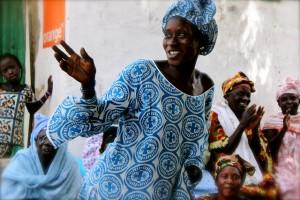
On June 12, 2015 the Ministry of Health and Social Action authorized the first prescription of the pill by community health workers (relais communautaires) serving in 10 out of the 14 regions in Senegal. The community health intervention areas in the regions are operated by Action and Development (AcDev) and Association Sénegalaise pour le Bien Etre Familial (ASBEF). AcDev’s advocacy, with the support of the Opportunity Fund, led to the authorization.
The Opportunity Fund, managed by PAI with funding from AFP, is a small grants program that helps advocates seize opportunities to accelerate Family Planning 2020’s success at district, state, national, and regional levels.
Over the last five years, the Ministry of Health and Social Action (MSAS) recognized family planning as a national priority and took steps to develop community health and task-shifting. However, the MSAS had not yet officially authorized task-shifting for the pill.
AcDev and ASBEF succeeded in having the tacit agreement of the ministry to distribute the pill in their areas of intervention as a pilot project, during which community volunteers reached more than 45% of women of reproductive age, but no explicit policy existed. The release of the 2015 National Strategic Community Health Plan provided ACDEV with an advocacy opportunity to seek formal authorization.
The introduction of the initial prescription of pills in the project intervention areas reaches:
• Women who do not want to be recognized at health facilities
• Women with financial constraints for obtaining access to contraceptives
• Women who are disinclined to go to health facilities, often because of domestic responsibilities
• Married or single women who seek confidentiality when accessing contraceptives
• Nomadic groups, for example Fulani women
AcDev worked closely with the Advance Family Planning local partner Réseau Siggil Jigeen in implementing this advocacy win and involved many partners such as IntraHealth, FHI 360, Population Council, and journalist networks.
AcDev strategized to involve the Direction for Reproductive Health and Child Survival (DSRSE) and the Community Health Unit established by the MSAS in 2013 during all phases of the advocacy. Additionally, AcDev and ASBEF, in collaboration with the DSRSE, organized workshops in the Guédiawaye and Koumpentoun health districts to strengthen the capacity of 30 relais community health workers on the initial prescription of pills and the use of new collection, supervision, and monitoring tools.
AcDev made a key decision to take the Director of DSRSE, Dr. Daff, and the Director of the Community Health Unit Dr. Mame Coumba Faye – the targeted decisionmakers – to Togo to learn from the Togolese Government’s experience in increasing the contraceptive prevalence rate by providing pills and injectables through community health workers. The authorization from the MSAS came through immediately following the trip to Togo (see attached). AcDev commends the leadership of Dr. Daff and Dr. Faye, who were present throughout the process and were open to new initiatives.
AcDev and MSAS officials agreed, in light of the major progress seen in Togo with the involvement of community volunteers, to consider introducing other methods like Sayana Press® in the future. AcDev will continue to advocate for this and aims to mobilize resources to scale-up the community health initiative.

